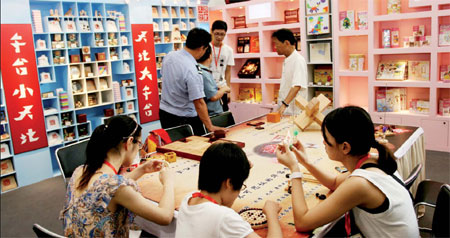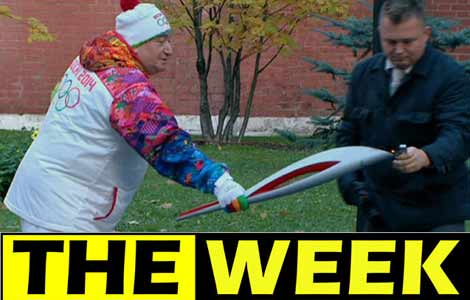Minnow carves its credentials in wood
Updated: 2013-10-11 09:54
By Yan Yiqi (China Daily)
|
|||||||||||
From the days when it made chopsticks, Chairs and chessboards, the county of Yunhe has come a long way. more than half the world's wooden toys are now made there
The setting and story are almost of fairy tale proportions - the tiny hamlet, by Chinese standards, of Yunhe, deep in the mountain forests of Zhejiang province, produces half the world's wooden toys.
There are 732 toy manufacturers in Yunhe, a small county of 110,000 people about five hours' drive southwest of the provincial capital Hangzhou. One in five of the population makes a living in the toy industry, whose output was worth 2.77 billion yuan ($453 million; 336 milion euros), accounting for almost a third of the county's total GDP.
"After 40 years of development, Yunhe has its label as the No 1 wooden toy manufacturer in China, even in the world," says Zhang Jianming, Party chief of Yunhe county. "There is no way that we will drop off. We are confident that within five to 10 years Yunhe will be the first word that will jump into people's minds when they think of wooden toys."
Yunhe accounts for more than 70 percent of China's production of wooden toys, and exports to 74 countries. And unlike other industries, it has not been affected by global economic crises.
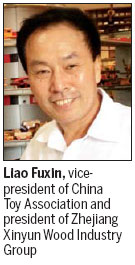
From 2008 to 2012, exports have grown by 15 percent every year. In the first quarter of this year, they reached $10.58 million, rising by almost 49 percent year-on-year.
Liao Fuxin, vice-president of the China Toy Association and president of Zhejiang Xinyun Wood Industry Group, Yunhe's largest wooden toy producer, says the fast growing export volume reflects market demand.
"Compared with toys made from other materials, wooden toys are safe for children to play with and environmentally friendly," he says. "In developed countries like Japan and the US, most parents prefer wooden toys."
After 40 years' development, a complete industrial chain has been established in Yunhe, he notes.
"Transport is very inconvenient in Yunhe, but our foreign customers still prefer to place orders with us because they trust our techniques and quality."
Just like a fairy tale perhaps, but while there is no mystery to the success of Yunhe's toy industry, there is an element of luck involved.
As a mountain county, wooden resources are abundant. Even before the first order of wooden toys was placed in 1972, the county's main industry was making wooden products such as chopsticks, chairs and chessboards.
However, due to fierce competition, the factories were not performing well at that time.
Jiang Zhenbiao, a county official, introduced toy manufacturing to Yunhe after he discovered that nearby counties were making great profits from it.
"Why can't we do that? I thought. And I must say, we really had a bit of luck," Jiang says.
Shanghai Light Industrial Products Import and Export Co had a huge number of foreign orders for wooden toys then and was looking to establish a manufacturing base.
Following efforts by Jiang and local factories, Yunhe was chosen - and its economy started to transform.
The local authority says the country's industrial output was worth 104,000 yuan ($17,000; 12,600 euros), in 1973 double the previous year. By 1980, output of wooden toys in Yunhe had exceeded 1 million yuan.
The opportunity provided by Shanghai companies was definitely crucial to Yunhe's success, but more important was the hard work people in the county put in.
Liao Fuxin started as a carpenter in 1973 when he was recruited to make wooden toys and has witnessed the whole development of this industry.
"In the early days, we lacked technology and equipment," he says. "We went to other counties to learn technologies and developed our own equipment. At that time, almost every household had a small workshop. There was no competition, just cooperation."
To learn and gain experience, Liao spent almost 24 hours a day in the workshop. He had his meals there and slept on the premises.
"There were lots of ideas in my mind. Sleeping in the workshop made it convenient for me to work them out immediately," he says.
After he established his own factory in 1984, he worked even harder. In the 12 years from 1988 to 2000, Liao reckons he spent every night in his workshop, and says he developed up to 8,000 different types of wooden toy.
"Our competitiveness does not rely on low prices, but on the numerous variety of products we can produce, and on our quality," he says.
Even though the European Union has raised standards for imported toys in recent years, Liao and most of his peers in Yunhe have been little affected.
In 1994, Liao's company was among the top 500 privately run enterprises in China. Last year, its output value reached 400 million yuan, or 15 percent of Yunhe's total wooden toy industry output.
Unlike other first-generation entrepreneurs in Yunhe who have passed their companies to the next generation, Liao is still working on the frontline.
"It's not that I love management power. I just love the industry so much that I don't feel like leaving it."
But all low-end manufacturing operations have had to go through industrial upgrading, and the wooden toy industry is no exception. Fortunately, both policymakers and entrepreneurs in Yunhe are clear about which roads they should take to progress.
Zhang, the Party chief, says one way is to add a greater cultural element to the products.
"OEM (original equipment manufacturer) operations helped the industry to develop, but its low added-value limited further development," he says. "Most capable companies already have their own brands, which is a good sign. The cultural industry, however, will add more value to these brands."
Ma Dawei, general manager of Yunhe Jinma Handicraft Co, says the value of his company's products has more than doubled since the company injected traditional cultural elements.
"Children can experience the charm of culture while playing with our toys," he says. "This is the value that parents are willing to pay for."
Generally, there are two main paths for wooden toy companies in Yunhe. One is to develop preschool educational toys, the other is to combine wooden toys with cartoons and animation.
"It is needless to say how much Chinese parents are willing to pay for their children's education," said Ma, whose company focuses on developing educational toys. "With parents' growing awareness of safety and environmental protection, wooden educational toys will become their first choice."
According to a report by the China Toy Association, China's toy market is growing 40 percent every year. It is estimated that by 2015, sales revenue of toys in China will exceed 500 billion yuan by 2015.
"Wooden toys account for no more than 3 percent of the market at present, so the potential is huge," Ma says.
Other Yunhe toy manufacturers are considering going down the cartoon and animation route. Liao for one believes animation is a perfect opportunity for further development.
"China's cartoon and animation industry has a market potential of more than 20 billion yuan," he says. "Increasing cooperation with animation companies in large cities like Hangzhou and Shanghai can help advertise our brands and sell derivative wooden toy products."
The biggest challenge to the wooden toy industry, however, is a shortage of talent in design, craft, management, technical and other skills.
"Yunhe is a very small county with poor transport. There's not even a railway," says Liao, who has set up a 30-strong research and development team in Shanghai.
"Of course I hope designers can come to Yunhe so we can discuss things face to face at any time, but who would want to come to such a remote place? The design department can be located outside Yunhe, but production and management cannot."
Liao hopes that when it comes to his son and daughters' turn to manage the company, the problem can be solved.
Meanwhile, to better serve his overseas clients, rival Ma Dawei has even moved his company's R&D department to Britain.
"We can invite foreign designers to come to Yunhe once or twice a year, but they are definitely not going to stay long," he says.
yanyiqi@chinadaily.com.cn
|
Most wooden toy companies in Yunhe have their own brands instead of only being original equipment manufacturers. Provided to China Daily |
|
The biggest challenge to the wooden toy industry is a shortage of talent in design, craft and other skills. Wooden toy companies in Yunhe have developed their products into preschool educational toys. Provided to China Daily, Provided to China Daily |
( China Daily European Weekly 10/11/2013 page16)
Today's Top News
Senate leader 'confident' fiscal crisis can be averted
Riding the wave of buy-ups
Working group to discuss sea issues
Chinese firm joins UK airport enterprise
Disaster response gets a helping hand
Have yuan, will travel far and wide
Draft regulation raises fines for polluters
Communities give care for elderly
Hot Topics
Lunar probe , China growth forecasts, Emission rules get tougher, China seen through 'colored lens', International board,
Editor's Picks

|

|
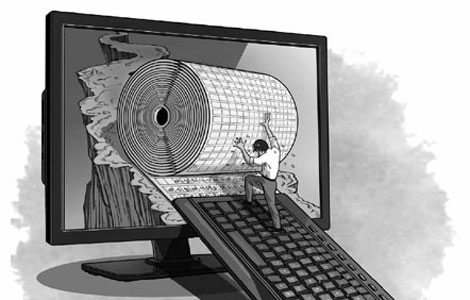
|

|
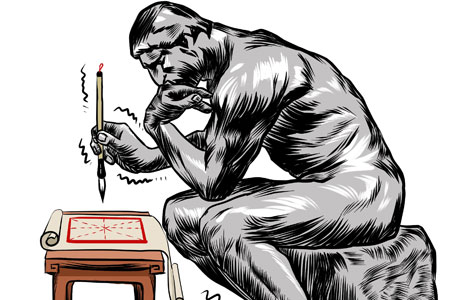
|

|
